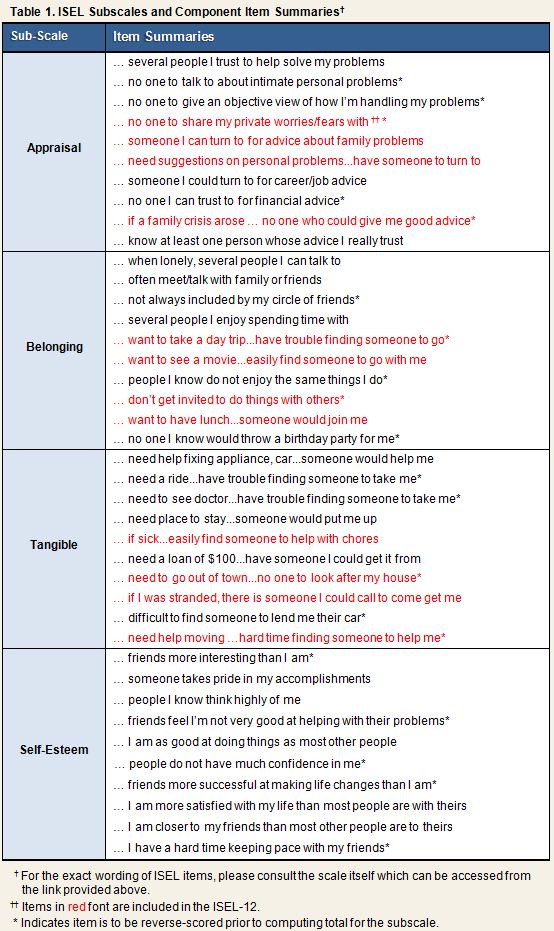Social Support
Title
The Interpersonal Support Evaluation List (ISEL); ISEL-12
Studies
BCS, PCS2, PMBC, PCS3
Copyright Information
Copyright is owned by Dr. Cohen
Primary Reference
Cohen, S., Mermelstein, R., Kamarck, T., & Hoberman, H. (1985). Measuring the functional components of social support. In I. G. Sarason & B. Sarason (Eds.), Social support: Theory, research and applications (pp. 73-94). The Hague: Martinus Nijhoff.
Purpose
To assess respondents’ perceived availability of four separate functions of social support as well as provide an overall measure of perceived support. The 40 items comprising the ISEL fall into four 10-item subscales:
- Appraisal – measures the perceived availability of someone to talk to about one's problems;
- Belonging – measures the perceived availability of people with whom one can spend time doing things;
- Tangible – measures the perceived availability of others who would provide one with material aid if needed;
- Self-esteem – measures the perceived availability of others with whom one can make positive self-comparisons.
Type of Measure
Established/Modified. The ISEL-12 is a 12-item modified version of the original 40-item ISEL. The modified version contains of three of the four subscales included in the original scale, with each subscale being comprised of only the four highest-loading component items (see Scoring and Variables).Description
Using a 4-point scale, participants indicate the accuracy with which several statements describing the availability of different types of social support reflects their perceptions of the support available to them in their own lives. No timeframe or referent period is used.
Scaling
0 = Definitely False, 1 = Probably False, 2 = Probably True, 3 = Definitely True
Number of Items
40 (BCS); 12 (PCS2, PMBC, PCS3)
Psychometrics
ISEL Internal Consistency Reliability (BCS)
- Total Scale, alpha = 0.92
- Appraisal, alpha = 0.87
- Belonging, alpha = 0.84
- Tangible, alpha = 0.79
- Self-Esteem, alpha = 0.69
ISEL-12 Internal Consistency Reliability
- Undergraduate student samples: Total Scale, alpha = 0.77 - 0.86
- General population: Total Scale, alpha = 0.88 -0.90
- Aggregated data from BCS, PCS2, PMBC, and PCS3
ο Total Scale, alpha = 0.85
ο Appraisal, alpha = 0.78
ο Belonging, alpha = 0.76
ο Tangible, alpha = 0.66
Scoring/Variables
Table 1 displays items comprising the 4 ISEL subscales. Subscale scores are computed by taking the sum of the values of all component items. Items indicated by an asterisk in the table are to be reverse-scored prior to computing subscale totals. The total ISEL score is computed by taking the sum of the 4 (or 3 if using the ISEL-12) subscale scores.